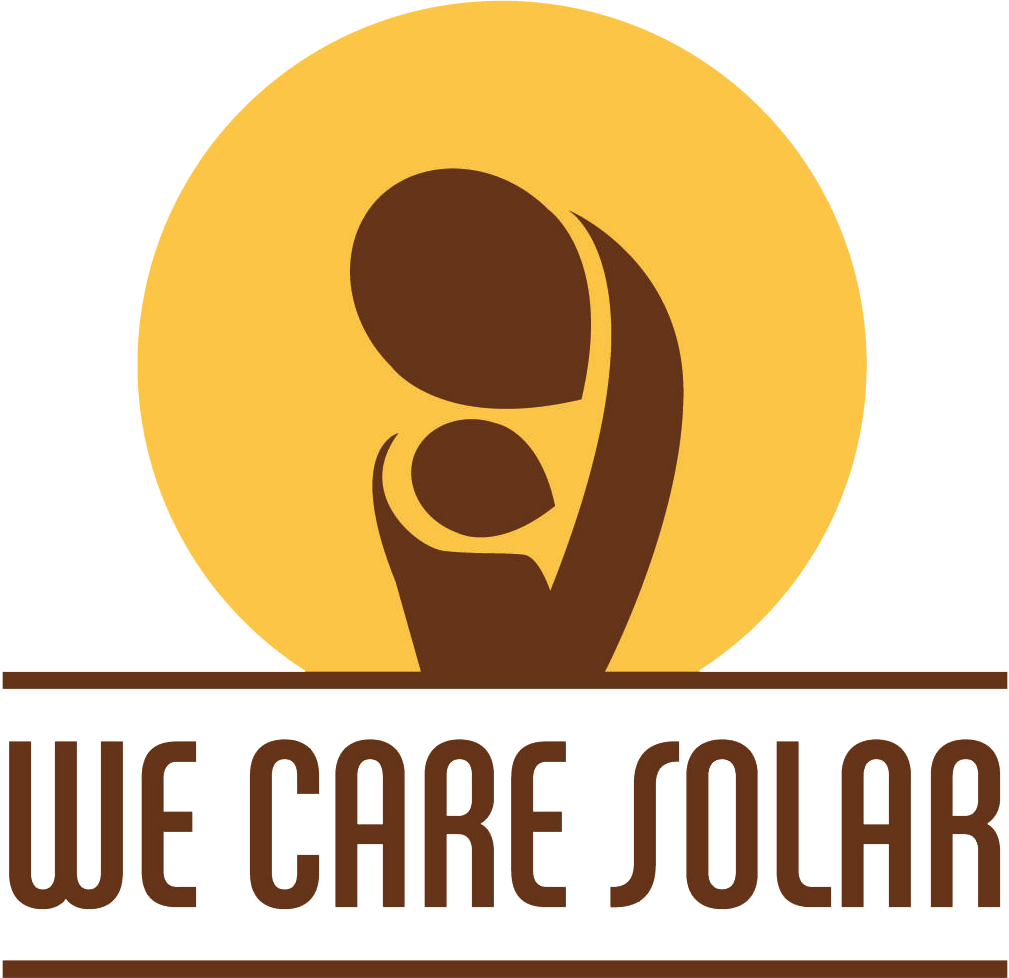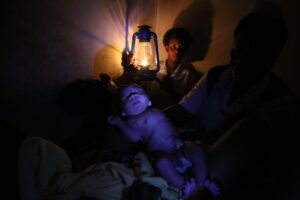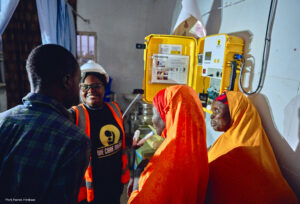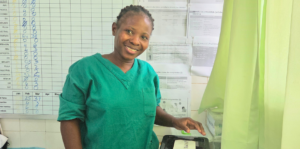 Dr. Bwire Chirangi is the medical director of Shirati Hopsital in Tanzania. In 2012, he told us his hospital was without electricity for up to six months at time. Dr. Chrirangi knows all too well the challenge of being a physician without reliable electricity. As an early adopter of the Solar Suitcase, Bwire can recount many experiences where lighting and phone charging made a life-saving difference in his ability to provide care to critically ill patients. We interviewed him in February 2015.
Dr. Bwire Chirangi is the medical director of Shirati Hopsital in Tanzania. In 2012, he told us his hospital was without electricity for up to six months at time. Dr. Chrirangi knows all too well the challenge of being a physician without reliable electricity. As an early adopter of the Solar Suitcase, Bwire can recount many experiences where lighting and phone charging made a life-saving difference in his ability to provide care to critically ill patients. We interviewed him in February 2015.
Can you tell me about yourself?
I am medical director at Shirati Rural District Hospital in Tanzania. I conduct general surgery, special obstetrics, gynecologic surgery, and handle a range of emergency surgeries. In addition, I practice internal medicine, pediatrics, infectious disease, and manage the inpatient and outpatient departments of Shirati Hospital. Furthermore, as the Medical Director of Shirati Hospital, my administrative duties include management, policy and planning.
How long have you worked at Shirati Hospital?
I have worked in Shirati for 9 years and I have been the Medical Director for five years. After finishing my medical studies, I earned my Masters in Public Health.
Who does Shirati Hospital Serve?
We are the referral hospital for the entire Shirati Rural District in Northern Tanzania – with a population of 265,241. Many health centers and dispensaries depend on Shirati Hospital for emergency care and surgical care.
What about obstetric patients?
We care for many emergency obstetric cases and conduct more than 270 deliveries a month. We receive many referrals of complicated pregnancies from dispensaries and health centers around the district. In addition, about 60% of women in this district try to deliver with traditional birth attendants (TBA) or at home assisted by non skilled personnel. When complications arise, the TBAs send their patients to our hospital, however we have been experience to receive patients/clients with critical conditions (“near missing”).
What kind of complications do you see?
We see complications such as obstructed labor, Retained placenta, Cord prolapse, eclampsia, antepartum and postpartum hemorrhage, placenta previa, placental abruption, uterine rupture, malpresentation/malposition.
Often their problems are in advanced stages due to a series of delays in obtaining skilled care. There are delays when unskilled TBAs fail to recognize the early stages of complications, delays due to inadequate education, inappropriate transport, and long distances. We also receive patients who have already delivered and suffer complications post-partum. Finally, we see patients who have long-term complications from prolonged obstructed labor, like VVF (vesico-vaginal fistula).
How does electricity play a role in your work?
In emergencies, we need full-time electricity. The Tanzania Electrical Company doesn’t provide continuous electricity. We are in a rural community and our lines connected from other district and not to the main grid as well as the lines are old; the infrastructure is not reliable. When the weather is rainy, cloudy, or windy, our power goes out. And we need a back-up source of electricity.
You received your first Solar Suitcase four years ago. Before you received the Solar Suitcase, how did you get light during the blackouts?
Before the solar suitcase, if there was no electricity, we used kerosene lamps. There were a lot of problems with the lamps: they make soot, we needed to buy the kerosene, the light was not reliable, they were dangerous, the light was not bright, and we couldn’t focus the light where it was needed.
With the Solar suitcase, we have a cheaper, brighter, more reliable source of lighting. We can position it wherever light is needed, and move the light from one location to another. The light is an excellent quality for medical care. There is no need to purchase fuel – because our source of fuel is the sun! We always have the Solar Suitcase on standby for medical care.
How has it affected medical care at the hospital?
We are working with confidence. We always know that even if the electricity goes off, we are able to use the Solar Suitcase. We charge up the battery once a week and each day make sure we are fully charged. Everyone is satisfied with brightness and the focus of the Solar Suitcase light.
Can you describe some of the ways the hospital staff use the Solar Suitcase?
With the Solar Suitcase you can focus. If you are in the operating room, the Solar Suitcase light is bright for operations. I have used it for surgeries, for vacuum extraction of difficult deliveries, for suturing episiotomies or lacerations. There are many emergencies where the Solar Suitcase has been a lifesaver. We use it for starting intravenous lines when antepartum or postpartum mothers are hemorrhaging, for infants and children who need intravenous blood or fluids. To save a woman, we might need to give blood transfusions, give medication, or conduct a c/section. All of these procedures require light.
Can you describe any cases in particular where the Solar Suitcase made a significant difference?
There was a mother who delivered a baby and had post-partum hemorrhage. She was bleeding profusely. It was heavy raining and the electricity was out. The Solar Suitcase provided the light for our team to provide emergency care. The woman was so dehydrated that we couldn’t find any veins in her arm. With the Solar Suitcase we identified the jugular vein (in her neck) and started an intravenous line. We gave her misoprostil and then a blood transfusion to save her life. That patient could have died if we didn’t have the Solar Suitcase.
Do you use the Solar Suitcase for patients in the hospital outside of the maternity ward?
We have used the Solar Suitcase for a range of surgical cases. We have used the light to treat patients after a traffic accident. We use it in the pediatric ward to treat children with malaria, diarrhea, malnutrition, and infections. And we use the Solar Suitcase to charge cell phones. This lets the nurses call the doctors when there are emergencies.
How do you make sure the Solar Suitcase is ready when you need it?
We have three Solar Suitcases. Our maintenance officer connects the solar panels every week to full charge. If the weather is rainy or cloudy, he puts the solar panels out when it is sunny. He takes it back to the particular wards where they belong. We have been doing this for years. The whole staff knows about the Solar Suitcases.
How has the Solar Suitcase affected the work environment at the hospital?
Working with human beings, even before you do something, you need your confidence. You don’t like to pray before major or minor surgeries because you are not sure you are not able to manage. Living in rural Tanzania, we don’t have reliable electricity because of the infrastructure. Whenever it is raining or stormy the power goes off. The main electricity goes off even if you want to do surgery. Having the Solar Suitcase improves your morale. With the Solar Suitcase, I can proceed with the surgery. It gives me confidence because I know we can complete the procedure.







